Livestock are more than food.

In the context of climate change, measurement of the use of animal resources in all its components is a key issue. It includes the use of animal products for human food consumption but also many other uses: fibre, feed, energy, manure for fertilisation, biodiversity and fire management, enhanced nutrition, building insulation, medical intervention, drug production, as well as culture and vibrant rural communities.
All these uses, as well as food, contribute to the closing of the biological cycle, and are key points to reduce waste and valorise the contribution of animal production to the circular bioeconomy. Some of them, like manure, fibre, and drug production, are alternatives to the use of fossil resources, and contribute significantly to improving the climate balance of animal production.
The theme of the Symposium covers all species and involves all actors, including production, industry, and the co-product valorization sector.
- Assessment methods to estimate all non-food use benefits with the appropriate measurement tool;
- Demonstration of the contribution of the non-food uses to the overall balance of animal production and energy consumption or greenhouse gas emissions;
- Fields of research necessary to increase the benefit of non-food use of animal products;
- Estimation of synergies and trade-offs between food and the other valorizations;
- Compatibility of these uses with health and food security (the spectre of BSE is still present in public opinion);
- Wool, leather, fur, feathers, clothes, bags, equipment, insulation for houses or cars, etc.;
- By-product of slaughtering: fat, protein, bones, and product extracted (collagen, gelatin (cooking));
- Methane or biogas production as a renewable energy source;
- Manure to fertilise soils;
- Landscape management (forest fire, avalanches), effect on soil with pasture and trampling;
- Eco-shepherding in towns;
- Used as a mediator in certain mental illnesses;
- Support of human culture (cf. classification of transhumance on patrimony of UNESCO);
- Animal traction: skidding (forest preservation); local transportation in some villages or towns, for example for waste disposal or taking children to school
Programme
Provisional programme
(PDF – 173.17 KB)
Additional info
Venue
Firenze Fiera Spa
Firenze FI Italy
Organiser

European Association for Animal Production

Animal Task Force
International Organisations
